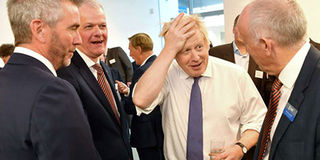Out of Europe after 47 years, now comes the tricky bit for Britain

Britain's Prime Minister Boris Johnson (centre) meets local business leaders prior to chairing a cabinet meeting at the National Glass Centre at the University of Sunderland, in Sunderland, northeast England on January 31, 2020, the day that the UK formally leaves the European Union. PHOTO | PAUL ELLIS | AFP
What you need to know:
- Mr Johnson has argued against any extension of the transition period, predicting quick progress in the negotiations.
- It is a fair bet that European powers who feel betrayed by Britain will be in no mood to make things easy for their ex-partner.
If you are reading this on Sunday morning, it will be just hours since the union flag was unceremoniously lowered at the European parliament and Britain formally quit the European Union after membership lasting 47 years.
I write this ahead of the event, but I think it is safe to predict there will have been no exceptional demonstrations of either jubilation or condemnation of the 11pm January 31 exit.
Since Boris Johnson came to power at the head of a new Conservative government and leaving became inevitable, the energy seems to have gone from an issue which has so sharply divided the British people over recent years.
Britain’s 73 Union MPs are looking for new jobs, and a one-year transition period is starting during which a new trade deal must be reached which would set out the parameters of Britain’s future role.
A deadline of December 31, 2020 has been set for a new agreement to be accepted and ratified by all 27 member nations, failing which the UK will exit on a no-deal basis.
BETRAYAL
Mr Johnson has argued against any extension of the transition period, predicting quick progress in the negotiations.
Europe’s civil servants are not so sanguine. They point out that in addition to the thorny question of trade, agreement will also need to be reached on security and law enforcement issues.
It is a fair bet that European powers who feel betrayed by Britain will be in no mood to make things easy for their ex-partner, or facilitate quick passage of any agreement that may be reached.
* * *
With Europe fading from the headlines, at least temporarily, climate change has become the major issue of concern, with dire predictions for the future of planet Earth.
The increase in global warming is ascribed to greenhouse gases caused by the burning of fossil fuels such as coal and crude oil, as well as by deforestation and emissions from domesticated animals.
The Committee on Climate Change last week urged Britons to cut the amount of beef, lamb and dairy produce they eat by a fifth and consider plant-based meals instead.
Its report said major changes were necessary “in the way we use the land, the way we farm and what we eat.”
Reducing the amount of beef, lamb and dairy by 20 per cent and cutting food waste by 20 per cent would save the equivalent of seven million tonnes of carbon dioxide from farms.
* * *
Convictions and cautions for crimes involving knives in England and Wales have hit a 10-year high.
According to figures from the Ministry of Justice, more than 22,200 cases were dealt with by police and courts in the year to last September.
This marks a three per cent increase on the year before and is the highest figure since 2009 when cases exceeded 26,000.
The rise has been ascribed mainly to an increase in people being caught in possession of a knife.
The ministry said more jail sentences were being imposed for knife crimes and had increased on average from six months to eight months.
Some social commentators argue that longer sentences are not a sufficient deterrent and what is needed is to tackle the root causes of the violence.
* * *
Talking of food, the divergence between British people and say, the French and Spanish, has been highlighted by a new report on eating habits.
While the continental Europeans can spend several hours over dinner, the average British family gets through the day’s main meal in just 20 minutes. Everybody then dashes off to catch up on work, social media or television.
A quarter of people polled by the food group Princes said they watched TV during dinner.
* * *
Last week, this column mentioned the courier scam which was costing victims thousands of pounds.
A friend tells me of a different trick. A man with a French accent at a parking meter, said his card had not worked, perhaps because it was foreign, but if my friend used his, it would dislodge it.
My friend obliged but the meter swallowed his card. The foreigner then persuaded him to use a second card, which, foolishly, he did.
That, too, was swallowed. By the time my friend got to the bank and cancelled the cards, several hundred pounds had disappeared from two accounts.
It seems a wire loop is inserted in the meter to trap the cards. The same device is used with ATMs.
* * *
Ten o’clock at night and the phone rings on the hotel receptionist’s desk. “This is your guest in fifth floor room 50. I need your help. My wife is threatening to jump out of the window.”
Receptionist: “I am sorry, sir, that is a personal issue. I am alone here and cannot assist on personal issues.”
Guest: “It’s not a personal issue, idiot; it’s a maintenance issue — the damn window won’t open.”





